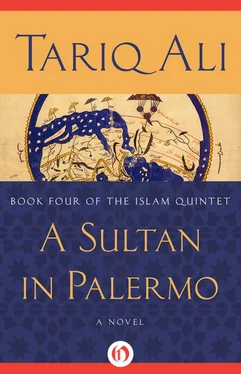While the indictment was read the Amirs and the other Believers were restless. Their discontent was reflected in excessive shuffling, a regular clearing of throats, occasional sighs and at least two loud farts, all of which combined to produce a distinctly uncongenial atmosphere. As Philip prepared to address the court there was total silence. Whereas the prosecutor had addressed the court in stilted Latin, Philip spoke in fluent Arabic. ‘I did not betray the Sultan’s trust. This Sultan has, till now, been kind to me and regardless of what happens today I wish to state that Sultan Rujari Ibn Rujari has been a just ruler. He has treated all the people of this island well, regardless of their faith. He has never insisted, till now, that prisoners be brutalised and their women violated. So I reject the principal charge you bring against me, to the effect that I betrayed the trust of our ruler.
‘Nothing I did was in secret. Yes, I provided oil for the synagogues. The Sultan knew and approved. Yes, I did not permit the decline of the eighty remaining mosques in Palermo. The Sultan accompanied me once to see for himself the improvements in the Ayn al-Shifa mosque of this city. When you say I was hardly in church you speak a deliberate untruth and may God forgive you. The Sultan knows how many times I attended his own chapel. He knows how often I went to the church he has built in Cefalu at every stage of its construction.
‘Let us proceed to the next charge. I was too lenient to prisoners in Ifriqiya. I plead guilty. I treated them as I would treat any human being. The fighting was over. We had won an important victory. The Zirid dynasty crumbled to dust before my eyes. Had I been soft-hearted in the course of the battle you would have had cause to bring me before you. But on behalf of this Sultan, I took al-Mahdia, the city of my youth. I will not hide from you the inner pain I felt. That I was instrumental in taking this city gave me no pleasure, but my loyalty to Siqilliya was never in doubt. The Bedouin whom I paid to fight on our side wanted to loot the city indiscriminately and take their pleasure of any woman, young or old, who was not already in hiding. War arouses the lust for loot and human flesh. I gave firm instructions that this should not happen. When these were disobeyed I had three Bedouin and six of our own soldiers flogged in public for rape. Yes, I stood there and watched them bleed. Do I regret that? No. And I would do it again. I think in better times the Sultan would have defended all these actions.
‘I have nothing more to say. I know that the fires that will consume me have already been lit and I am prepared to meet my Maker. I have done nothing of which I am ashamed. My only regret is that I had no opportunity to live among our people because whenever I asked myself how the earth procured the food we eat in order to survive the answer was never in doubt. It was the ordinary peasants on the land who produced the food and from the comfort of this palace, I sometimes envied them their closeness to the earth. I remember mentioning this to many people.
‘To the Sultan I will say this: if I have offended you in any way I beg your mercy and I apologise. I have always been loyal to you and your family. Those who have poisoned your ears with regard to me are the same people who will try and get rid of your sons and the system of administration that your father and you helped to create. Think of that when you watch me in the flames.’
The Barons rose to protest and shouts of ‘Cut off his tongue’ were heard from the mouth of more than one monk. The prosecutor had worked himself into a confected rage.
‘We have a witness who will testify that this man concealed his real faith behind a Christian mask. Bring him in.’
The guards brought in a venerable merchant, Ali ibn Uthman al-Tamimi. He was one of the most respected traders in the city and had attended the mehfil at the Ayn al-Shifa mosque which Philip had attended just before he was arrested. The marks on his face suggested that violence had been inflicted on him.
The merchant was asked to swear on al-Quran that he would speak the truth. He spoke in a very low, broken voice, not daring to face Philip. But he did not mention the meeting. He testified that on a single occasion he had prayed together with Philip at the mosque. The evidence was enough to condemn him. As he was leaving he looked up at Philip with tearful eyes and in a voice that was heard throughout the hall he said: ‘Forgive me. They threatened to rape my ten-year-old daughter.’
At this point Philip, greatly angered by the sight of an old friend who had been humiliated and tortured, demanded to speak. The Sultan nodded. ‘Burn me, if you will, but do not inflict suffering on innocent people. Yes, it is true I was a secret Believer, but my sin lay not in my belief but in my cowardice. I should have told the Sultan and for this I beg your pardon and plead for your mercy. I was very young when I came to the Court and you were so kind to me that I wished to please you in every way. But when I accompanied the Amir George to Mahdia, memories of my childhood overwhelmed me and it was at that time that in my heart I became a Muslim once again. I do not regret my choice. I know you will burn me today for that is the custom of your faith. But before I am sentenced I wish to address the Sultan directly.’
Rujari looked at him and for the first time their eyes met. Rujari nodded and turned away quickly. ‘I thank you, gracious Sultan. You more than anyone else present here — and I do not see our friend Master Idrisi in this gathering for which I thank him — understand full well that the reason you and your noble father were able to resist the commands of the Popes in Rome was because, even after the conquest of Siqilliya and the handing over of the most fertile estates to your Barons and the Lombard barbarians from the North, even after all that, my people are still a majority on this island. That is why your Barons speak and understand my language. And that is why you and you father could resist papal demands to send soldiers to fight in the Crusades. We were your strength, we gave you the courage to be independent, our learning, our language, our culture enabled you to boast that you were superior in every way to your poor cousins in England, which was only the truth.
‘Living under an occupation is never easy, but your family made it less painful because you needed us for your own reasons. And we needed you to survive. If you destroy us — and forgive my boldness… but we all know that the decision to burn me is a victory for those who would like to burn every Believer on this island, if you destroy us you destroy yourselves. One, perhaps two, Hautevilles might reign as kings. Then your fellow religionists will sweep southwards and take what they believe belongs to them by papal right. At that time there will be no force left here to defend your family. As for these unfortunate eunuchs you have imprisoned with me, they are completely innocent. Their only crime is that they worked with me, but then so did the Sultan for many years. To punish them is base and unworthy and I would plead for mercy on their behalf. Spare their lives. You have mine. Your monks and Bishops wish to consign me to Hell. But Allah alone will decide.’
As he stepped back and bowed half-ironically to the Sultan, the Amir of Catania could not contain himself. He rose from his bench. ‘Allah will send you to heaven, Philip al-Mahdia. Allah akbar.’
Angered by this display of insubordination, Rujari rose from the throne and still refusing to look his old friend in the eye he addressed the court. ‘Most distinguished sirs who sit in judgement today, my words are for you. My soul is pierced by the greatest grief, and roused to passion by severe torments, because this minister of mine, whom I raised from boyhood so that, having been purged of his sins, the Saracen might become Christian, is yet a Saracen and, under the name of faith, has done deeds of faithlessness. Had he offended our majesty in other ways, had he carried off a greater part of our treasure, we would have forgiven him because he had done great service for us. But because he has offended God and has furnished others with the opportunity and the precedent of sinning, and because I should not forgive an injury to our faith and a crime against the Christian religion by my own son, nor should I acquit anyone else. In this act let the whole world learn that I love the Christian faith with absolute constancy and do not refrain from avenging any injury to it, even by my own ministers. For this reason are laws set up and for this reason our laws are armed with the sword of fairness; they wound the enemy of the faith with the sword of justice, and thus they set a terrible snare for the infidels. Most distinguished sirs, you who are here to judge this crime, do your duty.’
Читать дальше












